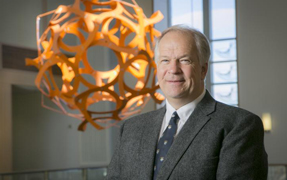Simon Blackmore: Farming with robots
Precision agriculture recognizes the natural variability found on farms and customizes treatments involving planting, watering, weeding, and pesticide application.
Developed agriculture uses massive amounts of energy in a myriad of forms, from the energy associated with chemicals used to control pests and diseases, through fertilizers, to the tractors themselves and the fuel to power them. This energy is often wasted as it goes off target, and it is increasingly expensive.
Smarter machines should use the minimum amount of energy to turn the natural environment into useful agriculture, thus cutting out wasted energy and reducing costs. Precision farming recognizes the natural variability found on farms and changes the management and treatments to suit. This variability takes both spatial and temporal forms. Spatial variability can be understood and managed by creating yield maps and soil maps. Temporal variability is often fundamentally linked to changes in weather over time, resulting in the need for real-time management.
In industry, we used to have a production line mass producing one item and are now moving to flexible manufacturing, where each item is developed individually. In agriculture we can see a similar approach by reducing the scale of treatments from farm scale to field scale to sub-field scale, and even individual plant treatment.
Simon Blackmore is Professor and Head of Engineering at Harper Adams University (Newport, UK), director of the National Centre for Precision Farming and also project manager of the European FutureFarm project. He holds seven Chairs around the world and leads the research in the UK on agricultural robotics. His personal research focuses on improving precision farming by developing more intelligent machines and processes, and making crop production more efficient and sustainable.



